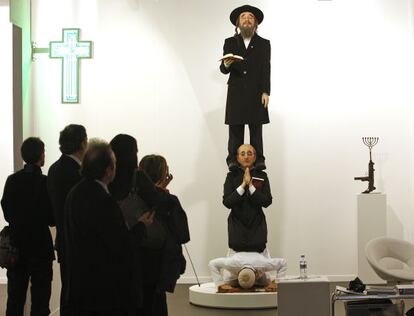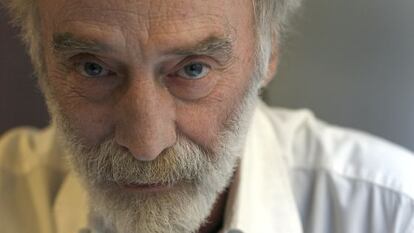Blasphemy ain’t what it used to be
Offending religious feelings is still a crime under the Penal Code Singer Javier Krahe has recently been prosecuted for the offense

God is busy with bigger things, but the arrogance of men makes them feel obligated to defend him, Penal Code in hand.
On the basis of that legislation, a Catholic association named after the Renaissance philosopher Thomas More took two people to court: the singer-songwriter Javier Krahe and Montserrat Fernández, director of a television program that aired an old movie about Krahe’s life which included a humorous sketch showing viewers how to “bake” a crucifix in the oven.
The trial sparked a flood of comments by supporters and opponents of the legislation; there was also heated debate regarding the fact that the offending events were so old — Krahe’s crucifix short was released in 1977, and the television program dates from 2004.
Blasphemy is as old as the hills. Luis Alberto de Cuenca, a philologist, delves into the history of the concept: “It is a Greek word and it did not have the meaning then that it does now,” he says. “The Greeks could not possibly have conceived of it as an offensive word against God, the Virgin Mary or the saints because they had numerous gods and goddesses and didn’t feel the need to lash out at them during angry outbursts, which is what usually happens among the followers of the biblical God in Judeo-Christian religious thought.
Blasphemy is a Greek word and did not have the same meaning it has now”
“The Greeks’ idea of ‘blasphemy’ was to utter words of ill omen or those that should not be spoken during a sacrifice,” he explains.
Sensibilities continue to be easily ruffled, even today; so much so that the Spanish Penal Code has renewed its faith in the notion that proper punishment will encourage blasphemers to hold their tongues.
“Blasphemy used to mean death not so many centuries ago,” notes José Antonio Martín Pallín, an emeritus magistrate. “It still crops up from time to time, like when [Salman] Rushdie nearly lost his life, and the same with the cartoonist who drew Muhammad. It happens among us. I remember [playwright Albert] Boadella being persecuted for blasphemy.”
Regarding the fact that blasphemy is included as a crime in the Penal Code, he says that “it is enormously arrogant for human beings to feel that they must protect the all-powerful God.”
It is arrogant for humans to feel they must protect the all-powerful God”
The criminal code is there “to protect tangible objects,” he adds. “Who is to say which feelings must be protected? And who gave these folks from the Thomas More association the legitimacy to interpret religious sentiment and erect themselves as its guardians?"
Martín Pallín also notes that even theologians can disagree over what constitutes blasphemy, since “what a Tridentine theologian thinks may not coincide with what a Liberation theologian thinks.” For all these reasons, blasphemy is “a criminal figure that must be eradicated.”
José María Martín Patino, a theologian who was an aide to Cardinal Tarancón, thinks in similar terms. “If someone exclaims ‘¡hostia!’ [Spanish for the Eucharist wafer, which is also used as a curse word], it’s not meant as an insult against God. And naturally I don’t think blasphemy should be resolved through the Penal Code. I simply see it as a bad way to use your freedom. I think a well-bred man should not disturb another man’s freedom by damaging his symbols.”
When people blaspheme, says Patino, they are making an extreme use of anticlericalism, “which is one of the most commonplace clichés in conversation.” But he also believes, like the magistrate, “that we Catholics should not wave the Penal Code around to defend God. We are not in the times of the Inquisition, which did more ill than good!”
We Catholics should not wave the Penal Code around to defend God”
The writer Eduardo Mendicutti says he dislikes insults and blasphemy, but that turning it into a crime is senseless.
“And yet, let’s say I’m gay and somebody insults me — I will sue him if he is offending me,” he says. “And if I were a religious person I would do the same thing. But there are some very cynical Catholics out there, who spend their entire lives insulting others but not accepting the slightest criticism... I don’t like blasphemy because it is offensive, but to encode it into the Penal Code...you have to prove that it is truly causing damage. As for artistic creation, it is true that religion interferes in our lives and that a creator has the right to reflect that in his work.”
One need look no further than the Bible to find blasphemy. Moses got angry with God, as did many other people. “I don’t like blasphemy, I don’t like insults,” says former Socialist culture minister César Antonio Molina. “I prefer dialogue and reasoning. But given the extremity of the case in point, what the legal powers should do is differentiate between freedom of expression and freedom to prohibit blasphemy.”
The poet Luis García Montero recalls an old anecdote told by Ricardo Gullón, a literary critic and district attorney. “Somebody was reported for insulting ‘El Gran Señor.’ The plaintiffs thought the man was referring to Francisco Franco. But when they found out it was God who was being insulted, the justice system paid no more attention to the matter.”
Religion interferes in our lives and a creator has the right to reflect that”
“Blasphemy is like carnival, but in language form,” says Montero. “It’s about inverting sacred symbols, just like those medieval rites that turned the devil into the Lord or idiots into bishops. That is why blasphemy is found in countries with a religious background. Spanish Catholicism fueled blasphemy. When puritanical ears disappear from our midst, it will no longer be fun to offend divinity.”
Adela Cortina, an ethics specialist, says you have to look at each individual’s beliefs to understand the role of blasphemy.
“Blasphemy, in the broad sense of the word and when it is done intentionally, is meant to hurt someone,” she explains. “That someone can be God, but then the blasphemer has to be a believer, otherwise the aim to hurt has no meaning, it falls on deaf ears. Or else the point can be to annoy those who are believers, to hurt their feelings, because the blasphemer thinks that faith is very important to those people, as much at least as their love of family or country. In that case, it’s a terrible way to encourage peaceful coexistence in plural societies; people should be thinking about joint solutions to social justice problems instead of irking one another.”
“It’s a matter of coexistence and thus a matter of language, of respect for language, for the other person’s language. And those who consider blasphemy the worst form of insult are making a mistake,” says the novelist Clara Sánchez.
When puritanical ears disappear, it will no longer be fun to offend divinity”
“It’s the most innocent form of offense that I know of, because it is not directed at any fellow human, or even a living creature, but rather at an idea, a concept, a feeling we call God. And it is very liberating to rebel against the one who got us into this absurd mess of desires and frustrations that we live in,” she says.
“It is almost always a ready-made phrase, a scream at the Great Beyond to tell it to stop getting up our nose. And the aim is to insult the cosmos, infinity, eternity, as much as it is to insult God,” adds Sánchez. “It is a way of revolting against dark matter, the Big Bang, a universe that is indifferent to our suffering and our joy, to our sickness and our calamities.”
Her colleague Julio Llamazares says blasphemy is overestimated in Spain, both by the blasphemers and the people who take offense.
“It’s just a form of release, as long as there is no intention to hurt. It’s true that Church representatives are very quick to take offense, even as they jealously guard their own privileges. There are people who speak in a very refined manner and utter grave offenses, and others who speak in a vulgar way and offend nobody.”
Those who consider blasphemy the worst form of insult are making a mistake”
Ian Gibson, the Irish historian and Federico García Lorca scholar who has been living in Spain since the return of democracy, uses movies to illustrate his point.
“I saw Monty Python’s Life of Brian, and I find it one of the greatest movies in film history,” he says. “It is irreverent, sarcastic. [...] Satires against monotheism are a healthy thing, because monotheism has been instilling the fear of God into us for centuries, telling us He is love yet at the same time terrible punishment. Fanaticism is dangerous, and religious fanaticism is extremely dangerous. It leads to war and death. It’s not a bad thing to use laughter and sarcasm against fanaticism to disarm the spiritual police.”
Writer Miguel Tomás y Valiente was the first to send an open letter condemning the trial against Krahe and Fernández. “I didn’t want them to feel alone, I didn’t want people to remain indifferent to the case. That is why I wrote the letter in their defense and against this Church that enjoys so many privileges yet does not accept the slightest criticism. Some of us are very weary of being on the losing side for such a long time.”
"I didn’t do any of the things they accused me of"

Javier Krahe is at last free of the nuisance that has been plaguing him for years. The lawsuit over a short film he made decades ago poking fun at Catholicism had been hounding him since 2004, when a legal association accused him of offending religious feelings. This week, a Madrid court acquitted him of the charges.
“It’s been a bother, although in these last eight years I probably thought about the matter a dozen times, half of them in the last three months,” said the 68-year-old singer-songwriter whose musical style and witty lyrics have earned him comparisons with French singer-songwriter Georges Brassens.
On the day of the trial, Krahe had stated that if found guilty, he would “go into exile in France.”
A second defendant in the case, Montse Fernández Villa, director of the television program that aired the controversial short, was also found “not guilty of hurting the religious feelings of third parties.”
The case caused a media stir because it is rare to see trials over religious motives in Spain, and because the events took place so long ago. La Cristofagia, a home video parody of a TV cooking show that demonstrated how to "bake" a crucifix in the oven, was shot in 1977, and a fragment of it aired on the television program Lo + Plus in 2004.
The judge found that Krahe was exercising his legitimate right to artistic expression and that the video, “with its burlesque component, represented a critique of religious manifestations in our society.”
“It is a penally atypical act, so that the defendants must be acquitted of the charge,” adds the ruling by Judge Jacobo Vigil.
The complaint was filed by Víctor Lozano, president of the legal association Centro de Estudios Jurídicos Tomás Moro, and by Nicolás Sala, neither of whom were present at the trial.
The magistrate noted that artistic creation often has “a provocative component” to it, and that satire has historically targeted different manifestations of power. Religion and the Roman Catholic Church, he wrote, have been associated with power in Spain, and have often been the subject of satire and legitimate criticism. Krahe’s short, he found, is “unequivocally satirical, provocative and critical, but lacking the intent to offend.”
“It was the other parties who had to prove their case,” said Krahe in a telephone interview from Valencia, where he was scheduled to perform. “I didn’t do any of the things they accused me of. We’re all the way we are, and feelings are a personal matter. It’s as if you could report someone for going around saying that Santa Claus was really your parents.”
The judge also found that the program director’s intention was to interview “a person of public relevance” and that she cannot be held accountable for the artist’s actions.
“It’s all over. The ruling is what it had to be. There was no legal footing. They can appeal it if they like — we’ll spend another eight years this way,” said Krahe.
For her part, Fernández Villa said she was happy with the decision, but “I would be even happier if article 525 of the Penal Code were to disappear.”
Tu suscripción se está usando en otro dispositivo
¿Quieres añadir otro usuario a tu suscripción?
Si continúas leyendo en este dispositivo, no se podrá leer en el otro.
FlechaTu suscripción se está usando en otro dispositivo y solo puedes acceder a EL PAÍS desde un dispositivo a la vez.
Si quieres compartir tu cuenta, cambia tu suscripción a la modalidad Premium, así podrás añadir otro usuario. Cada uno accederá con su propia cuenta de email, lo que os permitirá personalizar vuestra experiencia en EL PAÍS.
¿Tienes una suscripción de empresa? Accede aquí para contratar más cuentas.
En el caso de no saber quién está usando tu cuenta, te recomendamos cambiar tu contraseña aquí.
Si decides continuar compartiendo tu cuenta, este mensaje se mostrará en tu dispositivo y en el de la otra persona que está usando tu cuenta de forma indefinida, afectando a tu experiencia de lectura. Puedes consultar aquí los términos y condiciones de la suscripción digital.









































